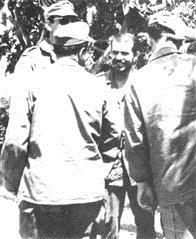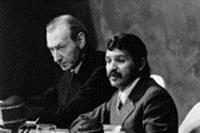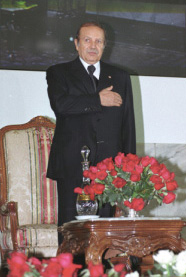President Abdelaziz Bouteflika of Algeria

Presidency Abdelaziz Bouteflika of Algeria is considered a greatest leader in many countries of the world for his remarkable contributions made to the economic development of Algeria in addition to various other outstanding achievements. In particular, President Bouteflika is noted for the successful implementation of three five-year development plans which literally transformed the country’ s economic and social infrastructures, industry, agriculture and services, and which allowed to solve the housing deficit and drastically reduce unemployment. Details of the achievements of President Bouteflika follow:
President Abdelaziz Bouteflika was born on March, 2nd, 1937. He joined the National Liberation Army (ALN) in 1956 while he was at high school.
He served as officer in his native region in the western part of the country then he worked his way up to join the ALN General staff.
In 1960, M. Abdelaziz Bouteflika was sent to the country's extreme south as a chief of the Mali's Front, created as part of measures decided to counter the France's plan to divide the country.
Immediately after independence, in 1962, M. Bouteflika, aged only of 25 years, was appointed Minister of Youth, Sports and Tourism, then one year later he became Minister of Foreign Affairs, position he held until 1979. Algeria's foreign policy has always been based on the fundamental principles of the respect of international law and support for just causes across the world, especially the fight against colonialism, and to establish a more equitable international economic and social order. Bouteflika’s action as Minister of Foreign Affairs allowed Algeria to hold a key position among developing countries as a privileged interlocutor of the great powers.

Algeria’ s unanimous election to chair the 29thsession of the United Nations General Assembly in 1974 are among the results of M. Bouteflika diplomatic actions. As Chair of the UNGA, his most important achievements were to get South-African regime's suspension from participating in the proceedings of the UNGA’s session and to obtain the international community's rejection of the policy of apartheid. A second highlight was to make possible for the leader of the Palestine Liberation Organisation, the late Yasser Arafat, to make an address at the UN General Assembly meeting.
Following the death of President Houari Boumediene in 1978, M. Abdelaziz Bouteflika was out of Algeria but followed closely the evolution of his country. He came back in January 1987 at the eve of the political reforms and the instauration of a multiparty system in 1988.
In 1994, he has been proposed to occupy the position of head of State as part of transitional period mechanisms.
He is elected President of the Republic in April 1999, than successively in 2004, 2009 and 2014.

As soon as he took office he committed to restore peace, security and stability. To this end, he initiated a legislative process for a civil concord, established on 16 September 1999 through a referendum approved by a large majority of Algerian voters.
During his first term in office, President Bouteflika launched a massive reform programme, including the State's structures and missions, economy, justice and education.
During his second term, he took a decision to constitutionalize Tamazight (berber), establishing it as the second national language of the country.
In September 2005, in line with his electoral commitment, President Bouteflika organized a referendum on national reconciliation. Nearly 80 percent of Algerians approved the Charter of National Peace and Reconciliation which ended an era of terrorism and violent extremism and opened the road for peace, reconciliation and the reconstruction of the country.
In 2011, during his third term in office, President Bouteflika initiated new political and social reforms to boost the decade-long efforts for the country's stability and development and to protect the country against the threats and turmoil faced by some neighbouring countries. This process was completed in February 2016 by the adoption of a new constitution representing the culmination of a broad national consultation.
On the economic front, the presidency of Abdelaziz Bouteflika was marked by the implementation of three five-year development programs which literally transformed the country’ s economic and social infrastructures, industry, agriculture and services, and allowed to solve the housing deficit and reduce drastically unemployment.

